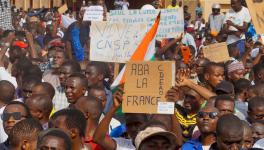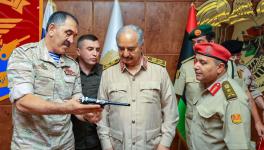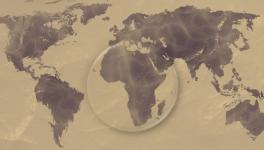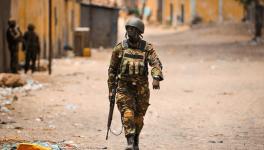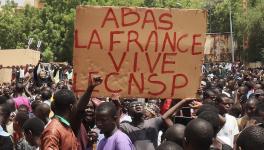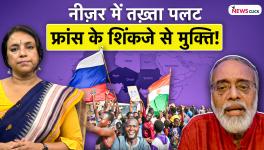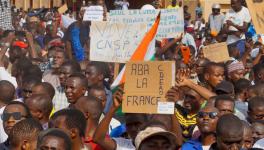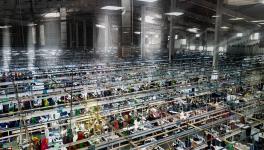DRC: Food Crisis Hits Goma Amid Renewed Fighting
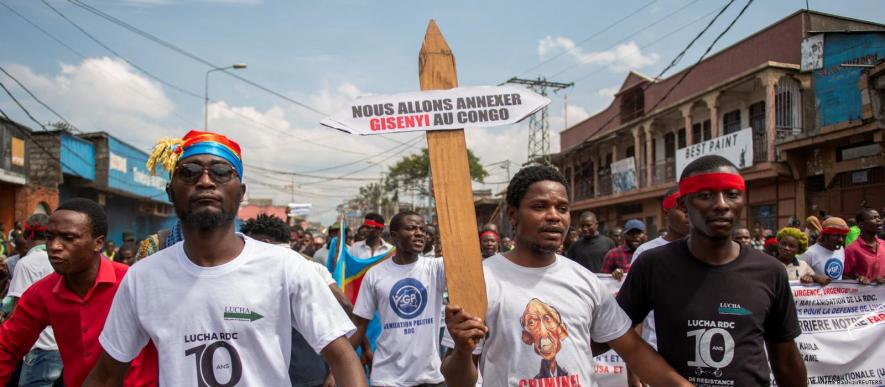
The current occupation of the towns of Rutshuru and Kiwanja by M23 rebels has also had a severe impact on the socio-economic conditions of residents in Goma in the Democratic Republic of Congo's North Kivu province. For several days, there has been no direct contact between Goma and Rutshuru, resulting – among other things – in a surge in food prices.
Fighters from the M23 Movement, which is also known as March 23, have tightened their grip on several territories after seizing strategic towns last month, cutting Goma off from the upper half of the province.

Willam Balungwe, a resident of Goma, told DW that locals are angry that the the fighting is increasingly impacting the lives of ordinary people, who don’t know what they will be able to put on the table.
"There are a lot of things that don't happen in Goma, and that drives up the price. The price of fish has doubled, and the price of beans and other things that come from Rutshuru have tripled. So, life has become so difficult, and we don't know how to get out of it," Balungwe said.
Since the rebels took control of part of the region a year ago, agricultural production has dropped dramatically in the Rutshuru territory – considered one of DRC's main breadbaskets.
Joséphine Mathé knows this all too well. The bean vendor told DW that many farmers have abandoned their fields, fearing for their safety in the midst of the violence.
"There is an increase in the price of beans. ... With repeated wars, farmers no longer have access to their fields," he said, adding that most beans he sells are imported from Tanzania.

Image: Moses Sawasawa/AP/picture alliance
Fears over possible closure of borders
Clarice Batenchi is in the tomato business. She lives close to a small barrier town situated between Goma and Gisenyi, located in neighboring Rwanda. In addition to scarcity, she faces another problem on top.
"I cross every morning to get tomatoes in Rwanda. I don't know what I would do if we closed the border, because that's all I have as a business," Batenchi told DW.
The DRC has repeatedly accused Rwanda of backing the M23 militia engaged in the fighting, which Kigali denies. The diplomatic stand-off could mean that the borders between the two countries might be closed.
People like Batenchi are now scrambling to come up with contingency plans. Erick Ngaboyeka is in a similar situation:, the Congolese vegetable seller is already contemplating what repercussion a potential closure of the border would have for him.
"I have the impression that in a few days, the border could be closed, and we who survive on these small (trading) activities, we feel that it will be difficult for us to support our families," Ngaboyeka said.
Diplomatic tensions rising
Tensions between the two countries flared up again on Monday, when a Congolese fighter jet entered Rwandan airspace. Rwanda called the move a "provocation" but Congo said it was simply a mistake since no military action was taken.
Bertin Sengiyumva, a young Rwandan who runs a small mobile phone shop in Goma, hopes things won't escalate further.
"I believe that leaders should think of the lower people before making certain decisions," he told DW, adding that his business “would suffer a lot" if the borders were to close.
Martin Madidi Fayulu, a Congolese opposition politician and leader of the Engagement for Citizenship and Development Party, told DW that in order for the conflict to quieten down, Rwanda must acknowledge its alleged role in the conflict:
"M23, they are Rwandans that were put in Congo by (Rwandan President Paul) Kagame to destabilize Congo because his objective is to get part of Congo. His objective is to get … Congolese minerals," Fayulu surmised.

Tens of thousands have fled the violence in Nnorth KivuImage: Guerchom Ndebo/AFP/Getty Images
Imminent food crisis
Meanwhile Thomas Gahamanyi, a Congolese economist, has issued a warning, saying that an imminent food crisis could hit the cut-off city of Goma, as M23 rebels have occupied and blocked the major road linking Rutshuru to Goma.
"Since the roads and our rural areas are occupied, there could only be a spike in market prices. I am already anticipating food insecurity in our households in the city of Goma," he said, confirming many of the fears that locals in the region have.
Mahamani has asked the government to "design food security strategies and policies" to weather the crisis. "Households that used to have rice, beans or potatoes as a staple food no longer know what to eat," he told DW.

Security forces in the region lack resources to defeat M23 fightersImage: Arlette Bashizi/REUTERS
Tens of thousands displaced
However, a more immediate drama is meanwhile taking place outside Goma city limits: The international medical charity Doctors Without Border (MSF) said on Tuesday that tens of thousands of people have now sought safety in informal camps in Kanyaruchinya and the surrounding areas, located 10 km north of Goma.
Kanyaruchinya, situated on the road between Goma and Rutshuru, was already hosting thousands of people displaced by previous rounds of fighting and May 2021 volcanic eruption.
"In just a few days, we have seen thousands of people quickly build shelters of eucalyptus branches and leaves collected in the surrounding forest, all whilst it is raining," MSF medical coordinator in DRC Dr Maria Mashako, Médecins said. "The families have only brought the bare necessities with them as they fled. They lack everything: healthcare, shelter, food, water, toilets."
Local authorities have confirmed that at least 74,000 people currently need aid outside of Goma already, following the latest round of displacements. This is in addition to roughly 186,000 people who had already fled the fighting, according to UN numbers.
Diplomatic rapprochement
Officials from both Rwanda and DRC have held talks in Angola on the weekend in hopes of ending the political stand-off. However, efforts to resolve the conflict are met with doubt, as the ideological trenches between DRC and Rwanda appear to run deep. M23 meanwhile has rejected attempts of establishing a ceasefire.
Congolese opposition politician Fayulu believes resolving the conflict will require more than just a ceasefire. He reckons that tackling government fraud and building a stronger Congolese army to fight M23 rebels should be prioritized.
"The first thing is to stop corruption. That is the first thing, and take the … money to form an army, a strong army," he told DW, adding that the DRC also needs support from the international community.
"The UN, AU and all countries like Germany, France, and the European Union" have to condemn Rwanda's role in the conflict, he said, comparing the situation in DRC to the war in Ukraine:
"Ukraine is having a problems, you [the international community] are condemning, and we are having problem in Congo, nobody is condemning Rwanda."
Wendy Bashi and Zanem Nety Zaidi contributed to this article
Edited by: Sertan Sanderson
Get the latest reports & analysis with people's perspective on Protests, movements & deep analytical videos, discussions of the current affairs in your Telegram app. Subscribe to NewsClick's Telegram channel & get Real-Time updates on stories, as they get published on our website.










